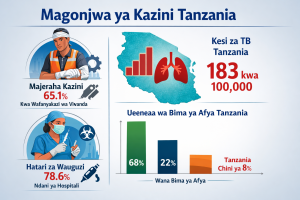
Bank of Tanzania Elects to Bar Foreigners from Working in Microfinance Industry, How Reckless that Sounds.
Kicking out Foreigners
In the draft Microfinance Regulations of 2024, the Bank of Tanzania (BoT) has elected to bar the employment of non-Tanzanians in its microfinance service sector. In a move targeting non-deposit-taking microfinance service providers and geared at taming an existing unemployment crisis at 8.9%, Tanzania is continuously tending towards protectionism and socialism tendencies. Despite a decrease in the unemployment rate from 9% in 2021, the nation is keen on preserving unemployment in this sector for local professionals only.
This move by the BoT raises critical questions on its implications for regional integration efforts, economic growth, and the intended spirit of cooperation under the East African Community (EAC) and African Continental Free Trade Area (AfCFTA) agreements. While the desire to address domestic employment issues may be noble, this regulation undermines and sets bad precedence around economic collaboration intention in Africa and the East African region as they hinder free labor movement.
Regional Integration Concerns
The BoT requires that microfinance service providers from mainland Tanzania do not provide employment or renew any contract of non-Tanzanian professionals unless they seek prior approval from the bank. The regulation will impact Tier 2 microfinance services provided including credit companies, finance organizations, housing microfinance companies, individual moneylenders, and digital microfinance lenders. This limits the number of employable foreigners to 5 even with prior authorization from the bank raising questions about the country’s commitment to regional integration and the creation of common East African and African markets.
One of the fundamental pillars of the EAC and AfCFTA agreements is the promotion of regional integration, fostering economic growth, and creating a common market with the free movement of goods, services, and labor. Certainly, the decision to curtail the employability of foreigners, citing the availability of qualified Tanzanians, the complexity of functions, and the complexity of functions and roles, undermines the intended regional integration goals. While the East African Common Market Protocol guarantees free movement of workers within the partner states to eliminate discrimination, Tanzania is ignorant of these provisions.
“With this, Tanzania is far from beating allegations of a long history of socialistic policies and tendencies that have hindered growth and led to poverty and servitude among citizens.”
The regulations proposed by the BoT limited the employability of foreigners to approval by the Tanzania Investment Center, emergencies, and the impact of knowledge on Tanzanians. It is therefore a matter of time before the precedence spreads to other sectors or attracts retaliatory measures from EAC partners further eroding the trust and collaboration needed to foster regional integration objectives.
Unemployment Crisis Vs. Protectionism
Tanzania’s justification for the new regulations revolves around addressing the unemployment crisis, estimated at more than 8.9%. While addressing domestic unemployment is undoubtedly a priority, the question remains: is restricting foreign employment the most effective solution? Such protectionist measures lead to a narrow perspective that limits the diversity of skills and expertise brought by foreign workers.
With this, Tanzania is far from beating allegations of a long history of socialistic policies and tendencies that have hindered growth and led to poverty and servitude among citizens. It is therefore necessary for the country to consider a more comprehensive approach around skill development, education, and the creation of an enabling environment for both domestic and foreign professionals. Notably, questions still linger on whether the employment of foreigners has had any significant impact on unemployment in the country or the microfinance sector.
Hurting the Microfinance sector
The microfinance sector plays a crucial role in fostering financial inclusion and supporting small businesses, contributing significantly to economic development. Restricting the employment of non-Tanzanians in this sector may inadvertently hinder its growth and innovation. Foreign experts often bring diverse perspectives, technical know-how, and best practices that can enhance the efficiency and effectiveness of microfinance institutions. Tanzania should carefully consider the potential negative impact on the sector’s ability to thrive in a competitive and rapidly evolving financial landscape.
Adherence to International Commitments

By introducing regulations that limit foreign employment, Tanzania risks breaching its commitments under international agreements, including the EAC and AfCFTA protocols. The benefits of the targeted common markets for the region and Africa respectively ride on the reduction of non-tariff barriers in the movement of goods, services, and labor. The move by Tanzania is bound to exacerbate discrimination on employment opportunities, remuneration, and other work and employment conditions. More critically, one would wonder whether the BoT considered the bad blood likely to characterize relations between citizens of neighboring nations with those of the host country.
The credibility of international commitments and agreements relies on the mutual trust and adherence of member states to the agreed-upon principles. Tanzania’s decision may set a precedent that other member states could follow, undermining the spirit of cooperation and collaboration essential for the success of regional integration initiatives.
Employing a balanced Approach
While addressing unemployment concerns is a legitimate goal for any government, a balanced approach that considers the benefits of foreign expertise and adheres to regional integration goals is crucial. Tanzania has to consider alternative measures, including promoting skills development, fostering public-
private partnerships, and creating a conducive environment for foreign and domestic professionals to collaborate. This calls for the nation to strive to strike a balance between protecting local employment opportunities and leveraging the advantages of a diverse and skilled workforce.
Tanzania’s decision to restrict the employment of non-Tanzanians in the microfinance sector reflects a delicate balance between addressing domestic unemployment concerns and upholding regional integration goals. As the country navigates these challenges, it is essential to consider the broader implications on economic development, collaboration, and the credibility of international agreements. Dealing with unemployment does not have to be a zero-sum game as serving such interest can be aligned with the principles of regional integration and global economic cooperation.



